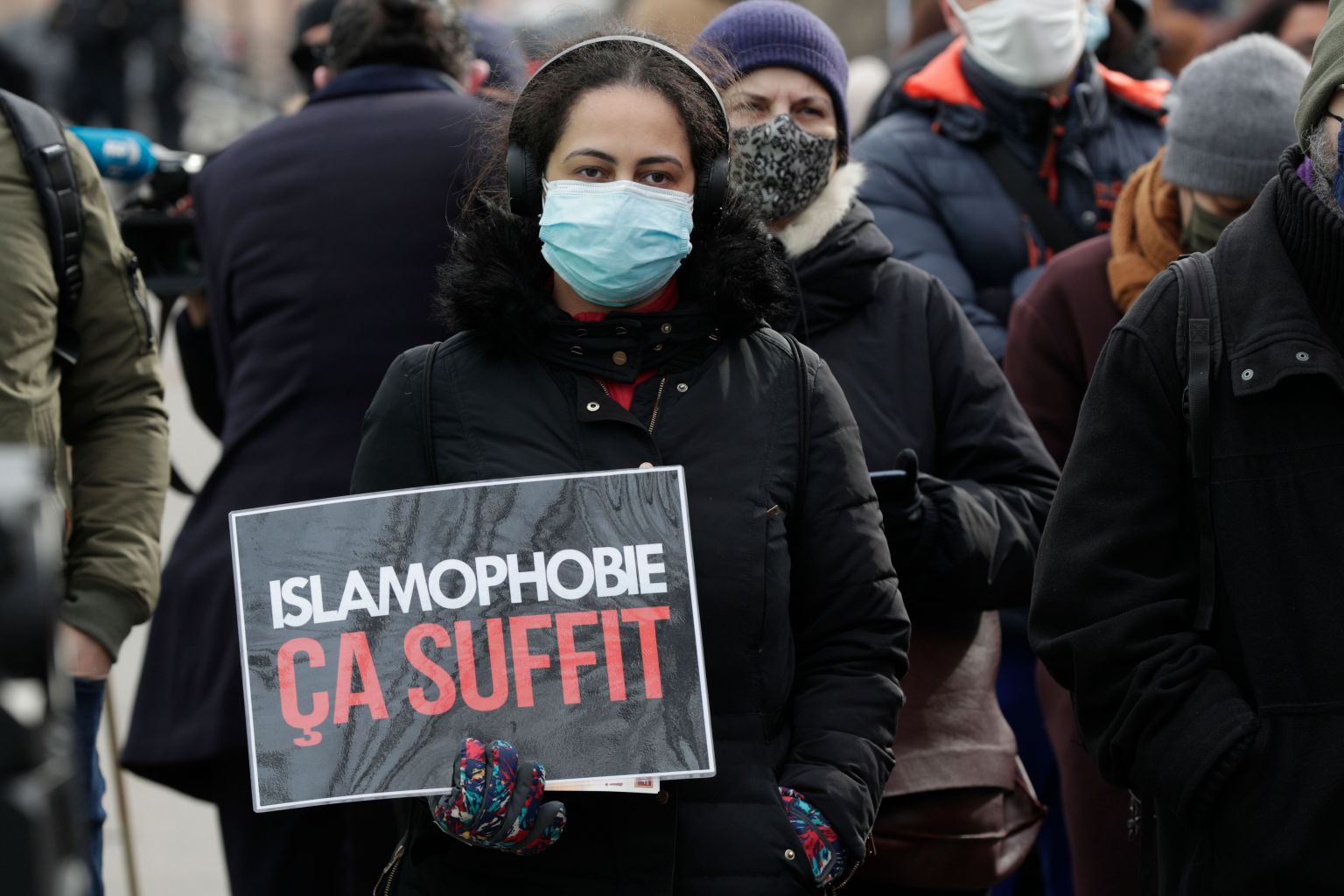What's in France's draft law against 'Islamist separatism'?
Sign up now: Get ST's newsletters delivered to your inbox

A woman holds a placard reading "enough of islamophobia" as protesters demonstrate against the Bill in Paris on Feb 14, 2021.
PHOTO: AFP
PARIS (AFP, REUTERS) - After months of controversy and 135 hours of parliamentary debate, MPs in France approved a draft law to crack down on what has been termed "Islamist separatism" on Tuesday (Feb 16).
The Bill passed by 347 votes to 151 in parliament's lower house, where President Emmanuel Macron's centrist ruling party and its allies hold a majority. The legislation now moves to the Senate, where the centre-right opposition dominates.
AFP examines what is, and what isn't, in the new legislation.
Why a new law now?
French President Emmanuel Macron laid the groundwork with a much-anticipated speech on Oct 2 about what he called the "fight against separatism." Macron denounced a trend of "Islamist separatism" that sought to create a "counter-society" rejecting the county's strict form of secularism, equality between the sexes, and other parts of French law.
Macron was accused by critics at the time of pandering to the far-right ahead of 2022 presidential elections and one line in particular - "Islam is a religion that is in crisis all over the world" - drew fierce criticism overseas.
The discussion severely intensified two weeks later when school teacher Samuel Paty was beheaded in the street by a radicalised teen of Chechen origin after showing his class cartoons lampooning the Prophet Muhammad.
For supporters of the new law, Paty's killing underlined the need for firmer action.
But critics saw the legislation as further stigmatising millions of French Muslims and pushing them to cling more closely to their religious or community identities.
What will the legislation do?
The most significant articles attempt to crack down on speech and actions by religious figures or organisations which are seen as subverting core values of the French republic.
"The republic does not have sufficient means to act against those who want to destabilise it," reads the preamble to the law.
The text would significantly expand the state's powers to close religious organisations and places of worship if they are found to air "theories or ideas" that "provoke hate or violence towards a person or people." It will also require all associations to commit in writing to uphold "republican values" if they accept state subsidies.
In order to crack down on religious funding from countries such as Turkey, Qatar or Saudi Arabia, the law will require associations to declare donations over €10,000 (S$16,000) - and have their accounts certified.
A new crime of "separatism" - described as threatening a public servant in order to gain "a total or partial exemption or different application of the rules" - would be punishable by up to five years in prison.
What restrictions are envisaged?
One article was inspired by Paty, who was the subject of an online hate campaign started by a parent of a student at his school.
The new crime, punishable by up to three years in prison and a fine of €45,000, would make it an offence to expose personal information about someone knowing that doing so would put them in danger.
It also makes it illegal for doctors to examine girls to establish if they are virgins, an unscientific practice sometimes demanded by families before religious marriages, the government says.
The draft law will also tighten controls on home-schooling and will extend the state's powers to close private religious schools.
What isn't in the law?
Although the introductory text refers to the threat of Islamism, the articles of the draft law are phrased to cover all confessional organisations and do not target Muslims or Islamic bodies explicitly.
France's constitution prohibits discrimination on the basis of religion, which means the law must be written in a way that means it applies to all.
The right-wing Republicans party and far-right National Rally both pushed during the drafting process for wider restrictions on the wearing of the Islamic headscarf in public, which they view as a manifestation of Islamism.
French law already bans the wearing of "ostentatious religious symbols" in schools, while full-face coverings such as niqab and burka are also forbidden in public.
The government rejected calls to ban the headscarf in universities or in the street, but the law will expand the demand for "religious neutrality" which already applies to public sector workers.
People working for private companies which provide public services - airport staff or certain types of transport workers, for example - will not be allowed to wear religious clothing.


